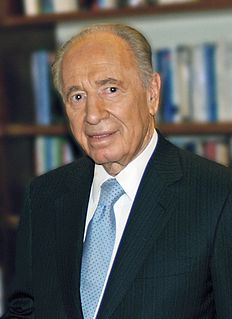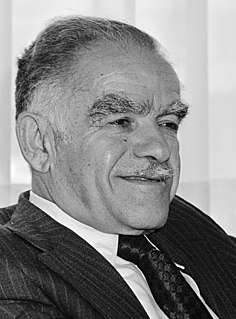This article includes a list of general references, but it lacks sufficient corresponding inline citations .(June 2022) |
Municipal elections took place in Israel on 25 October 1983.
This article includes a list of general references, but it lacks sufficient corresponding inline citations .(June 2022) |
Municipal elections took place in Israel on 25 October 1983.
Four candidates ran for Mayor in Jerusalem. Incumbent Mayor Teddy Kollek, as well as Meir Porush, Shlomo Tusia Cohen and Gershon Solomon. Kollek was re-elected with around 80,000 votes. In the City Council, Kollek's list, One Jerusalem, won 17 seats, the Likud won 4, Agudat Yisrael and the newly founded Shas won 3 seats each, Poalei Agudat Yisrael won 2, while Tadir and Mafdal won one seat each.
Seven candidates ran for Mayor in Tel Aviv, including Alignment candidate Dov Ben-Meir, Vicki Shiran, Yitzhak Artzi, Abie Nathan, Mordechai Virshubski and incumbent Mayor Shlomo Lahat. Lahat was re-elected with 58.4% of the vote. In the City Council, the Likud won 14 seats, the Alignment won 9, the Religious List won 3, the Liberal Party and Shinui won 2 seats each, and Abie Nathan's list won one. Hadash failed to cross the City Council's electoral threshold.
In Haifa, incumbent Alignment Mayor Aryeh Gur'el was re-elected with 63% of the vote. He defeated several candidates, including Scientist and Shinui candidate Yehudit Naot who won 6.6% of the vote, and pilot Yael Rom, who on 17% of the vote. In the City Council, the Alignment won 14 seats, the Likud won 5, the United Religious Front won 3, Shinui and 'Haifa the Right Way' won 2 seats each, while Hadash, the Youth List and the Liberal List won one seat each.
In Beersheba, incumbent Mayor Eliyahu Nawi was re-elected, defeating Labor candidate Uri Sabag in the second round.
In Rishon LeZion, Alignment candidate Meir Nitzan defeated incumbent Mayor Hananya Gibstein, winning 52% of the vote to Gibstein's 33%. In the City Council, the Alignment won 11 seats, Gibstein's list won 5, the Likud and the Religious List won 2 seats each, and a local list won one seat.
In Ramat Gan, Likud candidate Yisrael Peled won a plurality of votes in the first round, but won 1.2% (600 votes) less than the 40% of the vote necessary to avoid a runoff. Peled was defeated in the second round by Alignment candidate Uri Amit, who won 50.5% to Peled's 49.5%.
In Herzliya, Likud candidate Eli Landau defeated incumbent Labor Mayor Yosef Navo, winning 55% of the vote to Landau's 41.7%. In the City Council, Labor won 8 seats, the Likud won 7, and Mafdal and Agudat Yisrael won one seat each.
In Kfar Saba, Alignment candidate Yitzhak Vald was re-elected with 74.6% of the vote, with his party winning 10 out of 15 seats on the City Council.
In Migdal HaEmek, Likud candidate Shaul Amor defeated Alignment Candidate Ya'akov Toledano and Independent David Kadosh, winning 54.5% of the vote.
In Kiryat Gat and Kiryat Shmona, Likud candidates David Magen and Prosper Azaran respectively were elected Mayor.
In Bat Yam, Alignment Candidate Ohad Kinnamon was elected mayor, winning 44% of the vote. his party won 12 out of 23 seats on the City Council.
In Nazareth-Illit, incumbent Alignment mayor Menachem Ariev was re-elected. In the City Council, the Alignment won 8 seats while the Likud won 5.
In Bnei Brak, Moshe Irenstein was elected with around 55% of the vote.
In Givatayim, Alignment candidate Yitzhak Yaron was elected Mayor.
In Hadera, incumbent Mayor Yehiel Kahana was re-elected with 44.3% of the vote. In Holon, incumbent Alignment Mayor Pinhas Eylon was re-elected.
In Afula, incumbent Likud Mayor Ovadia Eli was re-elected unopposed.
Alignment candidates won Mayoral and Local Council elections in Givat Ada, Ness Ziona, Nahalat Yehuda (which later became a neighbourhood of Rishon LeZion), and Mitzpe Ramon.
Likud candidates won Mayoral and Local Council elections in Metula, Netivot, Menahemia and Kiryat Ekron.
Mafdal candidate Tzadok Ben-Yitzhak was elected Head of the Local Council in Mevaseret Zion, while incumbent Tiberias Mayor Yigal Bibi was re-elected.
No election was held in Ramot HaShavim, Savyon, Shavei Tzion and Azor as only one candidate ran for Mayor and Head of the Council respectively, and only one electoral list ran in City and Local council elections.
Katzrin held elections for the first time, where incumbent Head of the Local Council Sami Bar-Lev was elected under the "Katzrin on the Upswing" list.
Election Result - A (Jerusalem), B (Haifa), C, D, E, F, G, H, I, J, K, M, N, L (Kiryat Ata, Baka al-Garbiya, Cabul), O (Osfiya), P (Jat), Q (Ma'aliya, Ashdod), R (Ma'aliya, Nahariya, Ramat HaSharon)

Meir Porush is an Israeli politician who has served as a member of the Knesset for the Haredi Agudat Yisrael faction of United Torah Judaism in several spells since 1996. He served as the Deputy Minister of Education.
The Democratic Movement for Change, commonly known by its Hebrew acronym Dash, was a short-lived and initially highly successful centrist political party in Israel. Formed in 1976 by numerous well-known non-politicians, following a breakup it ceased to exist in less than two years.
Legislative elections were held in Israel on 31 December 1973. Voter turnout was 78.6%. The election was postponed for two months because of the Yom Kippur War.
Legislative elections were held in Israel on 17 May 1977 to elect the ninth Knesset. For the first time in Israeli political history, the right wing, led by Likud, won a plurality of seats, ending almost 30 years of rule by the left-wing Alignment and its predecessor, Mapai. The dramatic shift in Israeli politics caused by the outcome led to it becoming known as "the revolution", a phrase coined by TV anchor Haim Yavin when he announced the election results live on television with the words "Ladies and gentlemen—a revolution!". The election saw the beginning of a period lasting almost two decades where the left- and right-wing blocs held roughly equal numbers of seats in the Knesset.
The Alignment is the name of two political alliances in Israel, both of which ended their existence by merging into the Israeli Labor Party.
Legislative elections were held in Israel on 23 July 1984 to elect the eleventh Knesset. Voter turnout was 78.8%. The results saw the Alignment return to being the largest party in the Knesset, a status it had lost in 1977. However, the party could not form a government with any of the smaller parties, resulting in a national unity government with Likud, with both party leaders, Shimon Peres and Yitzhak Shamir, holding the post of Prime Minister for two years each.
Elections for the 12th Knesset were held in Israel on 1 November 1988. Voter turnout was 79.7%.
Morasha, later known as Morasha-Poalei Agudat Yisrael, was a small, short-lived religious political party in Israel during the 1980s.

The twenty-first government of Israel was formed by Shimon Peres of the Alignment on 13 September 1984, following the July elections. With both the Alignment and Likud winning over 40 seats each, neither side could form a stand-alone coalition, resulting in a national unity government, together with the National Religious Party, Agudat Yisrael, Shas, Morasha, Shinui and Ometz, which together held 97 of the 120 seats in the Knesset. However, in protest at the alliance with Likud, Mapam broke away from the Alignment, as did Yossi Sarid, who joined Ratz.

The twenty-second government of Israel was formed by Yitzhak Shamir of Likud on 20 October 1986. Shamir replaced Shimon Peres of the Alignment as Prime Minister as part of a rotation deal within the national unity coalition between the two parties. The only other change to the coalition was that the one-seat Morasha faction was not included, with the National Religious Party, Agudat Yisrael, Shas, Shinui and Ometz remaining part of the government, although Shinui left on 26 May 1987.

Yitzhak Ze'ev Pindrus is an Israeli politician. He currently serves as a member of the Knesset for United Torah Judaism.
Elections are held in Haifa to elect the city's mayor. Currently, such elections are regularly scheduled to elect mayors to five-year terms.
Municipal elections were held in Israel on 28 October 2003.
Municipal Elections took place in Israel on 10 November 1998
Municipal elections took place in Israel on 2 November 1993. They were the first in which Meretz and United Torah Judaism, who were founded after the previous round of municipal elections, stood candidates.
Municipal elections took place in Israel on 28 February 1989. They were originally meant to take place on 1 November 1988, but were delayed due to legislative elections taking place that day.
Municipal elections took place in Israel on 7 November 1978 and were the first Municipal in which Mayors and Council heads, and the Councils themselves, were elected in separate elections. These were also the first elections not to occur on the same date as a legislative election, and the first elections to take place after the 1977 election, which resulted in the Likud winning a plurality of seats and forming a government for the first time.
Municipal elections took place in Israel on 31 December 1973, having been delayed from their original date on 30 October because of the Yom Kippur War. They were the last municipal elections to take place on the date of a legislative election, and the first in which the newly formed Likud participated.
Municipal Elections took place in Israel on 28 October 1969, alongside a legislative election. They were the first to take place after the Six-Day War.